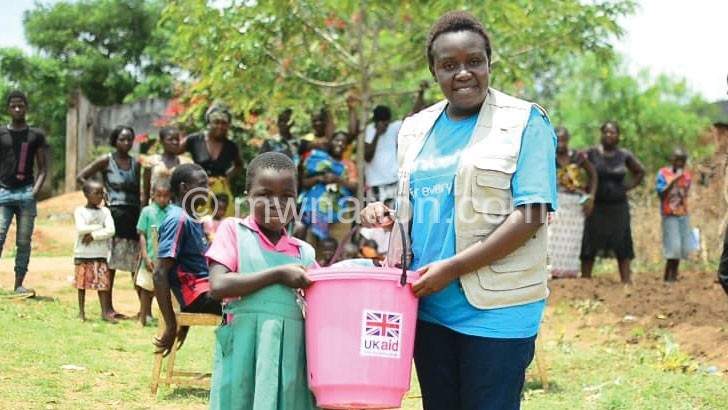Theatre bares sanitation gaps
It is sunny in Mpemba on the south western margins of Blantyre City. Some 10 young people are dancing in the sun, circling a giant drum as they warm up for a drama show calling for collective efforts to kick out cholera.
Their song is clear: You can claim to be using a clean toilet, but the disease outbreak prevented by using safe water and insisting on sanitation and hygiene will out you.

As the sun rises, the drama begins—and the audience is part of the cast. In this interactive play, a woman, sick and tired of using her neighbours’ latrine and defaecating in nearby streams and bushes, wants a quick end to this. Sadly, her husband, who staggers home noisily after gulping calabashes of local brews, says he cannot afford a latrine.
As action unfolds, another actor, who steps in to settle the dispute, turns to the crowd in strategically timed intervals: “Does this happen in our village? Is there anything we can do about it?
The answer to both questions is yeeeees!
Interestingly, some receive water buckets, soap and other sanitation-related prizes for getting one-on-one questions right.
So interactive is the play that it persuades the crowd to ask themselves tough questions, laugh at everyday risks exposing them to cholera and brainstorm how to ensure every home has a latrine with a drop-hole cover and a facility where people can wash hands with soap.
The youth group has been holding live performances and going door-to-door in Mpemba in a push to make cholera history.
“We are leaders of today, not tomorrow,” says Kamoto, 35. “We want people to think seriously about their behaviour that exposes us to preventable diseases, especially cholera. Change does not happen in a day, so we will keep going to them until everyone realises that a home is incomplete without a toilet.”
The Story Workshop Education Trust has trained and deployed 11 of these youth clubs with funding from UK Aid through Unicef Malawi.
To Unicef partnership and advocacy specialist Shorai Nyambalo-Ng’ambi, theatre for development (TFD) is proving effective in confronting everyday problems, not just cholera.
“When people discuss their problems, they work together to overcome them,” she says.
The TFD volunteers are working in cholera hotspots in Blantyre, where this year’s first cholera case, a driver from Lilongwe, died in a lodge in January.
They work in populous townships of Limbe, Gateway, Zingwangwa, Mbayani, Chirimba and Chilomoni where waste heaped along the streets and chocking streams shows a breakdown in water and sanitation services.
“People need to know how they can prevent cholera before an outbreak erupts. The groups work in our baby villages, communities likely to be affected by cholera unless they heed preventive messages,” says the Story Workshop or TFD officer Daudi Njerengo.
Last year, the outbreak affected 388 people and killed 18 in the capital, Lilongwe.
This confirms that cholera is a public health crisis for both rural and urban populations.
Njerengo wants urban dwellers to learn from the Lilongwe tragedy.
He explains: “Cholera affects everyone, except those who insist on safe water, hygiene and sanitation.
“Walking in Mbayani and other high-density townships where we are working, you will see numerous risk factors: Foodstuffs on sale without any cover, broken sewers spilling into waterways, uncollected garbage and families channelling human excreta from latrines into streams where others wash kitchen utensils as well as fruits and vegetables for sale.
Alex Mvenga, a community health worker at Mpemba Health Centre, commends the volunteers for stimulating conversations on the dangers of using unsafe water and poor sanitation.
He explained: “The interactive plays have awakened people to see the risks of constructing a home without a toilet. At the start of the intervention, only 34 out of 68 households in Lisiyo village had latrines—meaning half of the community was either sharing toilets or defaecating in the open. Today, there are 84 households and 75 have latrines. Interestingly, most people wash hands with soap after visiting the latrine.”
This is good news for Triphia Yatimba, a Standard Seven pupil at Mpemba Primary School, who was just one-year-old when the United Nations (UN) launched global hand-washing campaign.
She knows washing hands with soap eliminates germs which cause sanitation-related diseases that account for over half of the outpatients in the country’s healthcare facilities. With universal access to improved hygiene and sanitation, hospitals would be seeing fewer patients every day.
“Our teachers tell us to always wash hands with soap to avoid cholera and other diseases. In this way, we seldom fall sick and miss classes,” says the 11-year-old girl.
Interestingly, group village head Lisiyo has constituted a health committee to enforce bylaws that outlaw the sharing of latrines. Households without latrines pay five chickens which the committee sell to raise money for maintaining boreholes and communal kitchen utensils used during funerals.
Edith Kandaya and her committee say the village will stop at nothing until the campaign for improved water, sanitation and hygiene into life-saving action translates into healthy lives.
In her mind, she sees the well-being of the rural population improving as everyone uses safe water and sanitation facilities in line with Sustainable Development Goal number six (SDG6).
Says Kandaya: “We are tired of people who build homes without latrines. It is frustrating that despite these messages, some people do not have sanitation facilities. We will not leave anyone behind because the village will not be cholera-free unless all of us adopt safe practices.”





